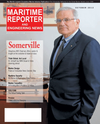
Page 23: of Maritime Reporter Magazine (October 2012)
Marine Design & Construction
Read this page in Pdf, Flash or Html5 edition of October 2012 Maritime Reporter Magazine
sion and revocation hearing contains an exception for purposes of ?impeachment?. If the mariner de-cides to make a statement to the Coast Guard but then changes his/her story in front of the presidingAdministrative Law Judge, the Coast Guard will be able to point out the inconsistency of a statement made during the investigation. Moreover, the word ?admission? is subject to a narrow definition. The Coast Guard could well argue that a statement with respect to the facts of the event is not necessarily a direct admission of fault and therefore can be uti- lized as evidence. The mariner may not have di- rectly admitted fault for the casualty, but that will not stop the Coast Guard from arguing that the facts of the event, as evidenced by the mariner?s own statement, should lead the ALJ to conclude that the mariner was negligent. Any statements made to an investigating officer, whether amounting to an admission or not, can beused to assess liability for civil penalties. The fed- eral statutes allow for imposition of a civil penalty of $5,000 for every proven breach of the Inland Navi- gational Rules (33 USC §2072 (a)) and $25,000 for every instance of negligent navigation (46 USC §2302(a)). There is nothing in the law or the regu- lations to prevent the Coast Guard from using any statement given in an interview to support its as- sessment of those civil penalties. Finally, there are certain licensed mariners, specif- ically state-licensed pilots, who might not worry about their licenses in the context of a Coast Guard investigation. If the pilot was operating under the authority of his state license rather than his federallicense at the time of the incident, the Coast Guardcannot suspend or revoke his federal license. How- ever, there is no specific regulation or statute which prohibits Coast Guard cooperation with state li-censing authorities. In other words, any statement made to the Coast Guard could very well be trans- mitted to the state licensing authority. The admin- istrative procedures in place under state law would then be the only possible protection from the use ofthose statements by the Board of Pilot Commis-sioners to suspend or revoke the pilot?s license. All of the above having been said, the decision whether or not to cooperate with the Coast Guardshould be made on a case-by-case basis. There may very well be instances in which a full exposition by the mariner may convince the Coast Guard that no further inquiry or investigation need be made and/or that no negligence or breach of the rules of the road took place. Being human, CoastGuard investigating officers and their superiors in the chain of command may be highly suspicious ofa mariner who absolutely refuses to cooperate. Butthe mariner?s decision must be made with the pre- sumption in mind that any statement given to the Coast Guard will be fully admissible in suspensionand revocation hearings, civil penalty hearings and criminal trials.Octoberr 2012 marinelink.com23Jeffrey Moller , partner at Blank Rome, is an experienced maritime law practitioner who has parlayed his tort litigation experience into successful representations in shoreside toxictort and environmental contamination cases. Mr. Moller has received the highest possible rating from Martindale- Hubbell. [email protected]#10 (18-25):MR Template 10/2/2012 10:43 AM Page 23

 22
22

 24
24
